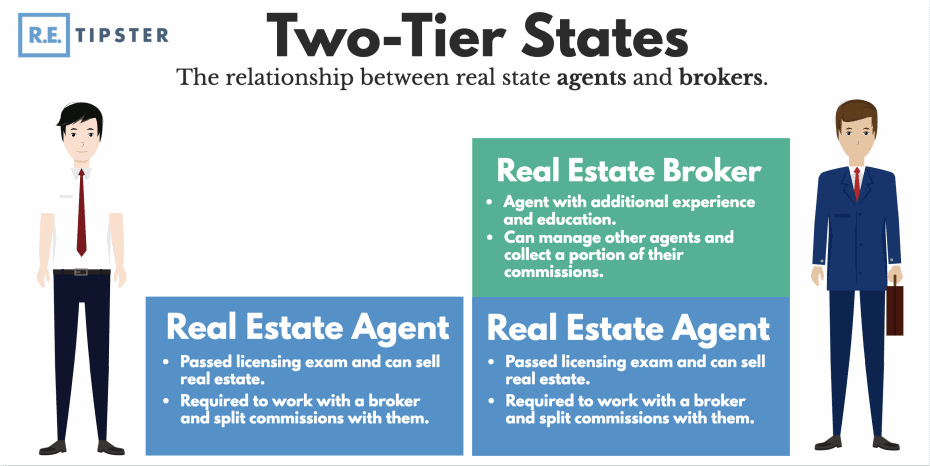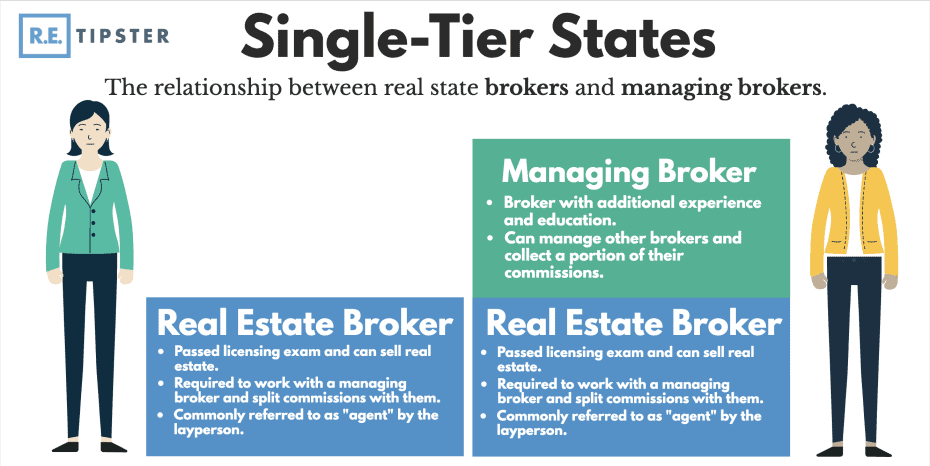What Is a Real Estate Agent?
REtipster does not provide legal advice. The information in this article can be impacted by many unique variables. Always consult with a qualified legal professional before taking action.
What Exactly Does a Real Estate Agent Do?
Real estate agents, brokers, and REALTORS® are all terms that describe real estate professionals who facilitate real estate transactions between parties. These professionals usually bring buyers and sellers together to complete a sales transaction and are then compensated with a commission — typically a negotiated percentage of the property’s purchase price.
Most of the time, the commission (which is commonly 6% of the purchase price paid by the seller) is divided between the real estate professionals involved in the transaction.
RELATED: What Is Realtor Commission?
However, while the titles of these real estate professions are often used synonymously, they are not always the same. In most states and circumstances, these terms can mean very different things.
Below are some common expectations clients may expect of their real estate agents:
- Find, list, buy and sell real estate properties
- Oversight in the staging and showing of a property
- Assist in determining the optimal asking price for a property, based on comparables, property characteristics and other external market factors
- Preparation and submission of all paperwork in a real estate transaction
Some real estate agents may go far beyond these baseline expectations as a way of differentiating themselves among their competitors.
Some examples of differentiation might be:
- A reduced sales commission
- Access to a more extensive network of cash buyers
- Higher quality photography and listing information
- Broader exposure for each listing
- A proven track record of selling properties faster than other agents
Not all real estate agents perform at the same level, and not all of these differentiating factors are equally important to all clients.
The Relationship Between Real Estate Agents and Brokers
In many states, the real estate industry generally organizes the tiers of real estate licensees into two groups:
- Real estate agents are typically known as the lower-credentialed group.
- Real estate brokers are typically known as the more-credentialed group.
In these states, a real estate agent is required to hold their license and operate underneath a real estate broker or brokerage and then pay a portion of their commissions to that broker in exchange for operating under their license. The broker will also commonly provide supplemental training, support, and resources for the agent.
This two-tier system is set up so that the higher-credentialed real estate broker can oversee the actions of a less-experienced agent.
Commission splits between agents and brokers are typically between 80/20 to 50/50 depending on how much value the broker brings to the relationship.
Some real estate agents who qualify for the broker’s exam may choose to remain as an agent to avoid the additional responsibilities associated with having a broker’s license.
A real estate broker can conduct all the same activities as a real estate agent but they aren’t required to operate under anyone else in order to conduct business. Furthermore, if a broker makes a commission for servicing a sales transaction, they can keep the entire commission. Many real estate agents ultimately choose to obtain their real estate broker status simply to avoid commission splits.
In other states, all real estate professionals who are licensed to sell real estate are technically labeled real estate brokers but the higher-credentialed brokers are designated as a managing broker and are required to have at least two years of active experience and additional education.
In these states, it’s common for the layperson to refer to non-managing brokers as “real estate agents”.
A managing broker manages a non-managing real estate broker in the same way that a real estate broker manages a real estate agent in a two-tiered state.
In commercial real estate, whether a person is licensed as a real estate agent or as a broker, it’s customary to refer to all licensed professionals as real estate brokers and refer to the more-credentialed tier as managing brokers.
What About Realtors?
A REALTOR® is a licensed real estate agent or broker who is a member of the National Association of REALTORS® (NAR).
According to the National Association of REALTORS® (NAR),
The REALTOR® marks let people know that you are more than just a real estate practitioner: you adhere to a strict Code of Ethics that protects clients, the public, and other real estate agents.
The word “Realtor” is commonly capitalized because the word is a registered trademark in the United States, and it can only be used by members of the NAR.
While all Realtors are required to hold their real estate license as either an agent or a broker, it is possible for someone to hold a real estate license without being an active member of the NAR.
Instead of joining NAR for access to the MLS, some residential and commercial real estate agents and brokers may prefer using listing services and databases provided by real estate companies like CoStar (which owns several other well-known real estate listing sites, such as Apartments.com, BizBuySell.com, and LandWatch) or Zillow (which owns platforms like Trulia, HotPads and others).
References
- Hensler, Matt. “The Definition of a Real Estate Broker in 500 Words or Less.” HubSpot, HubSpot, blog.hubspot.com/sales/real-estate-broker. Accessed 30 Mar. 2020.
- Weintraub, Elizabeth. “What Is the Difference Between a Real Estate Broker and an Agent?” The Balance, The Balance, 23 Oct. 2019, www.thebalance.com/real-estate-broker-and-agent-1798869. Accessed 30 Mar. 2020.
- Segal, Troy. “Real Estate Agents vs. Brokers vs. Realtors: What’s the Difference?” Investopedia, Investopedia, 22 Nov. 2019, www.investopedia.com/ask/answers/101314/what-are-differences-among-real-estate-agent-broker-and-realtor.asp. Accessed 30 Mar. 2020.
- Bortz, Daniel. “Real Estate Agent, Broker, Realtor: What’s the Difference?” Realtor.com, Realtor.com, 20 Oct. 2019, www.realtor.com/advice/buy/whats-difference-real-estate-salesperson-broker. Accessed 30 Mar. 2020.










